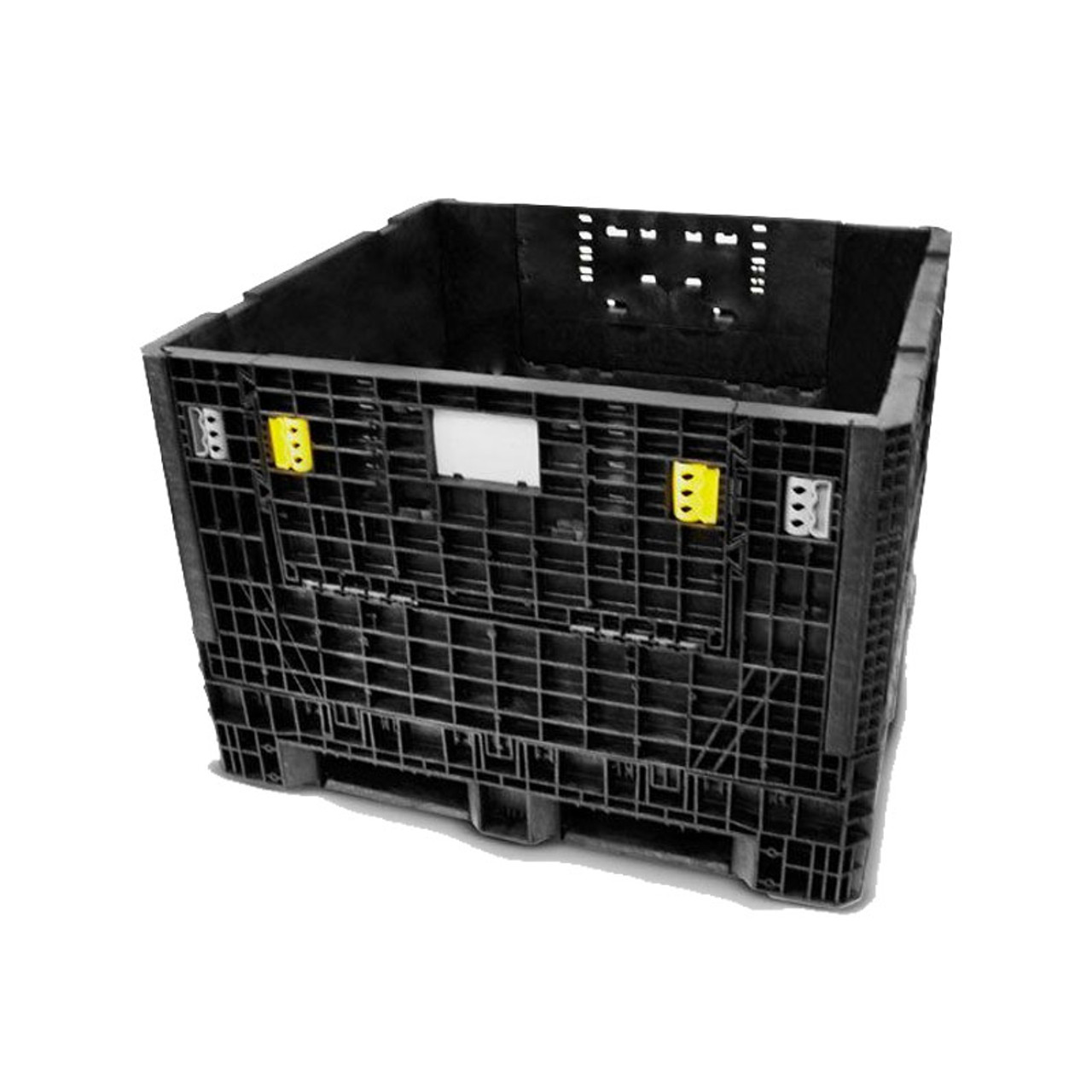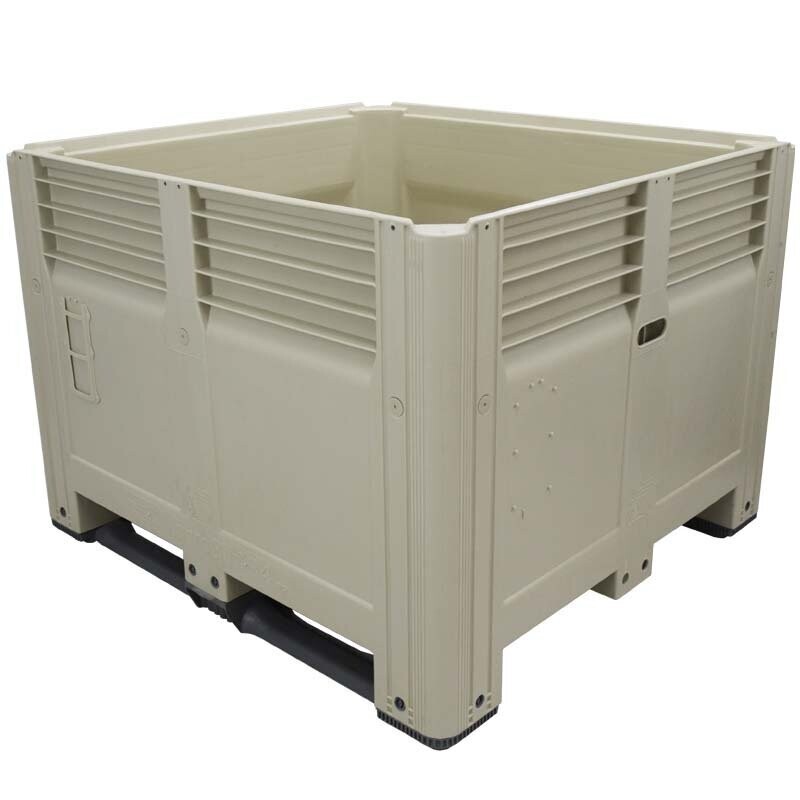The Duty of Bulk Plastic Containers in Effective Recycling Practices and Sustainability
Mass plastic containers are important to contemporary recycling initiatives. Their style improves the efficiency of product collection and transport, contributing to sustainability objectives. These containers not just maximize space yet likewise help in checking contamination levels. However, their execution is not without obstacles. Understanding the full range of their effect reveals a complex partnership between logistics and environmental obligation that warrants additional exploration.
Comprehending Bulk Plastic Containers
Bulk plastic containers function as a vital part in numerous markets, assisting in the storage and transportation of items. These containers are normally made from robust materials such as high-density polyethylene (HDPE) or polypropylene, which give longevity and resistance to ecological factors. Their layout often includes attributes like stackability and modularity, allowing for efficient usage of room during both storage space and transportation.
Industries such as agriculture, food processing, and making frequently use bulk plastic containers due to their light-weight nature and simplicity of handling. The containers can be found in different dimensions and arrangements, catering to the details demands of various items. Their flexibility extends past simple performance; they can also be personalized with lids, takes care of, and identifying options to improve use - bulk plastic containers for sale. As an outcome, mass plastic containers play a vital role in optimizing logistics and supply chain procedures across several industries, consequently contributing to general efficiency and cost-effectiveness
Advantages of Utilizing Mass Plastic Containers in Recycling
When organizations prioritize recycling efforts, the usage of bulk plastic containers considerably improves the effectiveness of the process. These containers are designed to enhance area, enabling the storage and transportation of larger amounts of recyclable materials. This results in fewer trips to recycling facilities, therefore minimizing gas usage and linked emissions.
In addition, mass plastic containers are resistant and durable to numerous ecological factors, guaranteeing that products stay shielded during handling and transit. Their light-weight design even more adds to lower transportation prices.
Furthermore, the uniformity of these containers promotes much better sorting and processing of recyclable products, which can improve general recycling rates - Bulk Plastic Containers. Organizations that embrace bulk plastic containers additionally show a dedication to sustainability, positively affecting their brand picture. Inevitably, these benefits not just improve recycling techniques yet likewise add to wider environmental goals
Exactly How Bulk Plastic Containers Facilitate Material Collection
Effective material collection is significantly enhanced by the usage of mass plastic containers, as they supply a organized and reliable solution for collecting recyclable products. These containers are created to suit large quantities of products, which simplifies the sorting and storage procedure. Their stackable style makes the most of area application, making it simpler for centers to arrange recyclables without clutter.
On top of that, mass plastic containers are resilient and weather-resistant, permitting outside positioning without destruction. This resilience assures that materials continue to be secured up until they are accumulated for handling.

The uniformity in shapes and size of these containers promotes standardization across collection points, making it possible for better monitoring of recyclable volumes. Their transparent nature permits for very easy visibility of components, assisting in the monitoring of contamination levels and assuring that only proper products are gathered. In general, mass plastic containers play an essential function in streamlining the product collection process, therefore promoting effective reusing practices.
Transport Performance and Environmental Impact
Transport performance plays an important function in the recycling procedure, specifically via the optimization of load capability in bulk plastic containers. By optimizing the volume of product moved, companies can greatly lower the variety of trips needed, consequently minimizing their carbon impact. This method not only boosts functional performance however also adds to much more sustainable ecological methods.

Enhancing Load Ability
Although maximizing tons ability is often neglected, it plays a necessary duty in improving transportation effectiveness and reducing environmental effect in reusing practices. By optimizing the quantity that mass plastic containers can hold, recycling operations can reduce the variety of trips required for transportation. This not just reduces fuel usage however likewise reduces the damage on automobiles. Efficient tons monitoring enables centers to utilize area successfully, guaranteeing that each transport cycle is as productive as possible. Furthermore, well-optimized lots can bring about better negotiations with logistics carriers, possibly minimizing overall expenses. Inevitably, improving tons ability adds to a more sustainable reusing system by promoting effective resource usage and reducing waste generated throughout transportation.
Reducing Carbon Footprint
As reusing procedures venture to decrease their ecological effect, decreasing the carbon impact connected with transport becomes a vital objective. Bulk plastic containers play a vital function in accomplishing this objective by enhancing lots effectiveness and maximizing logistics. Their light-weight yet resilient style enables for maximum cargo area use, reducing the number of trips called for to carry materials. By consolidating deliveries, reusing centers can reduce gas intake and greenhouse gas emissions. Furthermore, strategically situating recycling facilities lessens transportation ranges, in addition lowering carbon outputs. Moreover, employing fuel-efficient vehicles and alternative power sources boosts total sustainability. By integrating these practices, the recycling market can substantially reduce its carbon impact, adding to a more lasting future.
Difficulties in using Mass Plastic Containers

Contamination Problems
Contamination concerns stand for a substantial obstacle in the effective use bulk plastic containers within reusing practices. These containers often gather residues from previous materials, causing blended materials that can hinder the recycling process. Pollutants such as food waste, chemicals, or non-recyclable materials can jeopardize the honesty of the entire set, resulting in increased disposal prices and reduced recycling rates. In addition, inappropriate cleaning or sorting can aggravate these concerns, making it tough for reusing facilities to process materials effectively. The presence of impurities not only influences the high quality of recycled items however additionally weakens the overall sustainability efforts focused on minimizing plastic waste. Attending to these contamination difficulties is critical for enhancing the efficiency of bulk plastic container recycling.
Recycling Facilities Limitations
Inefficiency in reusing infrastructure positions significant difficulties for the efficient monitoring of mass plastic containers. Lots of reusing facilities lack the ability to process huge volumes of these containers effectively, resulting in boosted prices and hold-ups. Furthermore, poor arranging innovations commonly bring about contamination, as bulk containers might be blended with other materials, making complex the reusing procedure. Restricted transport options likewise impede the motion of mass plastic containers to appropriate recycling facilities, causing enhanced landfill waste. In addition, a lack of standard procedures for mass more helpful hints container recycling produces complication among organizations and consumers, further making complex efforts to promote sustainability. Dealing with these framework limitations is important to enhance reusing techniques and make the most of the possibility of mass plastic containers in a round economy.
Finest Practices for Implementing Mass Plastic Containers
They should focus on a tactical technique that boosts efficiency and decreases contamination dangers when organizations think about carrying out bulk plastic containers in their reusing techniques. Selecting the suitable container dimension and type is essential to fit the quantity of materials being processed. Organizations should likewise develop clear labeling and signage to guide customers on correct disposal approaches, decreasing confusion and mistakes. Regular training sessions for personnel can additionally strengthen these methods, ensuring every person comprehends their functions in preserving recycling stability.
Additionally, organizations must apply a routine maintenance routine to examine and clean containers, protecting against the build-up of impurities. Partnering with local reusing facilities can likewise streamline the collection procedure, guaranteeing that materials are efficiently processed. Finally, companies ought to check and evaluate their recycling metrics, utilizing this data to improve methods in time and promote continual renovation in their sustainability initiatives.
The Future of Bulk Plastic Containers in Lasting Practices
As companies significantly prioritize sustainability, the role of mass plastic containers in reusing practices is readied to advance significantly. Developments in products scientific research are causing the growth of recyclable and biodegradable choices, improving the environmental advantages of bulk plastic containers. Furthermore, the execution of closed-loop systems will certainly permit for less complicated collection and repurposing of these containers, decreasing waste and source consumption.
Technical improvements, such as clever radar, will make it possible for firms to keep an eye on the lifecycle of bulk containers, boosting efficiency in recycling processes. As consumer need for lasting methods expands, organizations will likely take on mass plastic containers developed go to this website for reuse and long-lasting value. Partnership in between markets and governments will certainly promote the facility of standard recycling protocols, making certain that bulk containers are successfully incorporated into broader sustainability efforts. On the whole, the future of bulk plastic containers shows up encouraging, with substantial possibility for adding to a circular economic situation.
Frequently Asked Questions
Just How Are Mass Plastic Containers Made and What Materials Are Utilized?
Bulk plastic containers are normally made from high-density polyethylene (HDPE) or polypropylene (PP) These products are processed with injection molding or strike molding techniques, resulting in sturdy, light-weight containers appropriate for numerous storage space and transportation requirements.
Can Mass Plastic Containers Be Reused Multiple Times Before Recycling?
Yes, bulk plastic containers can be reused several times prior to reusing. Their longevity and style enable repeated usage in various applications, advertising sustainability and source effectiveness while minimizing the need for new containers.

What Accreditations Exist for Mass Plastic Containers in Recycling?
Numerous certifications for mass plastic containers consist of the Recycling Partnership's accreditation, the Cradle to Cradle Certified ™ standard, and the Lasting Packaging Union's standards, making certain containers meet details environmental and recyclability standards for reliable recycling.
Exactly How Do Mass Plastic Containers Compare to Other Recycling Storage Space Options?
Bulk plastic containers use higher resilience and capability contrasted to other recycling storage options, minimizing the threat of contamination and helping with effective transport. Their design supports far better company, enhancing total effectiveness in reusing procedures.
What Is the Life-span of a Mass Plastic Container in Recycling Processes?
The life-span of a bulk plastic container in recycling procedures usually varies from 5 to ten years, depending on use, worldly top quality, and ecological problems, permitting numerous cycles of use prior to eventual disposal or recycling.
When companies prioritize recycling efforts, the use of mass plastic containers considerably enhances the efficiency of the process. Transport efficiency plays a vital role in the reusing process, especially via the optimization of load capacity in mass plastic containers. The use of bulk plastic containers in recycling practices deals with substantial challenges, particularly concerning contamination concerns and limitations within reusing facilities. Contamination problems stand for a significant challenge in the efficient usage of mass plastic containers within reusing techniques. When companies take into consideration executing mass plastic containers in their recycling practices, they ought to prioritize a calculated strategy that boosts effectiveness and minimizes contamination threats.